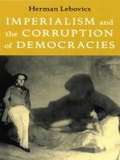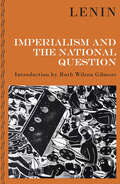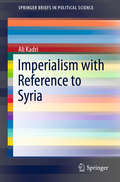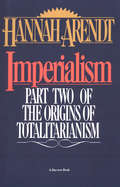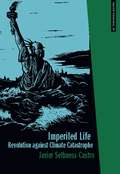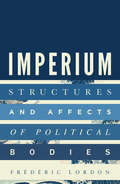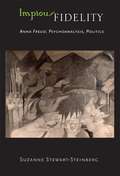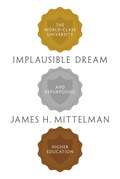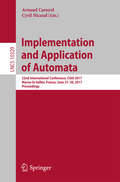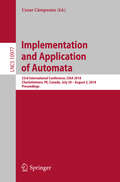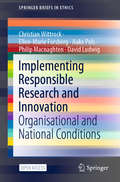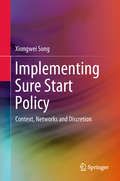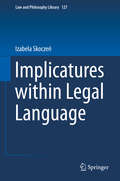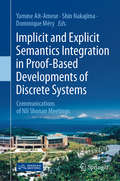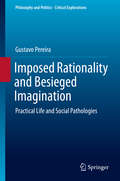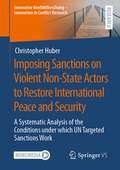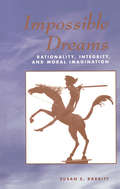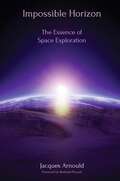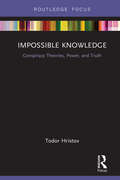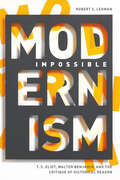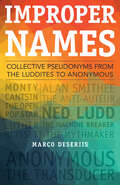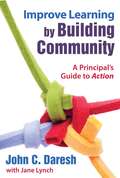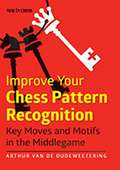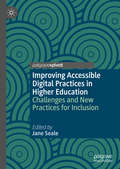- Table View
- List View
Imperialism and the Corruption of Democracies
by Herman LebovicsIn this important volume, Herman Lebovics, a preeminent cultural historian of France, develops a historical argument with striking contemporary relevance: empire abroad inevitably undermines democracy at home. These essays, which Lebovics wrote over the past decade, demonstrate the impressive intellectual range of his work. Focusing primarily on France and to a lesser extent on the United Kingdom, he shows how empire and its repercussions have pervaded--and corroded--Western cultural, intellectual, and social life from the mid-nineteenth century to the present.Some essays explore why modern Western democratic societies needed colonialism. Among these is an examination of the seventeenth-century philosopher John Locke's prescient conclusion that liberalism could only control democratic forces with the promise of greater wealth enabled by empire. In other essays Lebovics considers the relation between overseas rule and domestic life. Discussing George Orwell's tale "Shooting an Elephant" and the careers of two colonial officers (one British and one French), he contemplates the ruinous authoritarianism that develops among the administrators of empire. Lebovics considers Pierre Bourdieu's thinking about how colonialism affected metropolitan French life, and he reflects on the split between sociology and ethnology, which was partly based on a desire among intellectuals to think one way about metropolitan populations and another about colonial subjects. Turning to the arts, Lebovics traces how modernists used the colonial "exotic" to escape the politicized and contested modernity of the urban West. Imperialism and the Corruption of Democracies is a compelling case for cultural history as a key tool for understanding the injurious effects of imperialism and its present-day manifestations within globalization.
Imperialism and the National Question
by V. I. LeninLenin&’s texts breaking with Eurocentrism in the socialist movementFired up by the outbreak of the First World War and outraged by the capitulation of most socialist parties to the demands of national bourgeoisies, Lenin sought to understand the deeper roots of the crisis of the world movement. The result was Imperialism, the Highest Stage of Capitalism, which went on to become a core text for the international communist movement. But Lenin also sought to break with the Eurocentrism of the socialist movement, which tended to look down with disdain at or simply reject struggles for self-determination, especially among colonized peoples.This volume, with an introduction by the renowned abolitionist and anti-imperialist theorist Ruth Wilson Gilmore, brings together the texts on imperialism and those on the national question to provide a window into Lenin&’s global vision of revolution.
Imperialism with Reference to Syria (SpringerBriefs in Political Science)
by Ali KadriThis extended essay investigates the meaning of imperialism in Syria, providing a valuable addition to the ongoing debate on the Syrian crisis through the lens of imperialism, modern warfare, and geopolitics. It offers a detailed analysis of how the Syrian war has been the product of imperialist ambitions. The author begins by situating the Syrian conflict in the regional historical continuum, positing that the modern imperialist war visited upon Syria is both a production domain intrinsic to capital, and an application of the law of value assuming a highly destructive form. Such processes, particularly the measure of war as a component of accumulation by waste and militarism, are peculiar to the imperialism of the United States, which the author argues is the sole imperialist power at play in Syria, and globally. With so many international forces vying with one another in this country, and some prominent Western scholars equally ascribing imperialism to the US, Russia and China, defining “who the imperialist is” can help to clear some of the fog in the war of positions, as a misplaced or ideologically motivated assessment can provide the wrong party with a justification for prolonging the war. This book will be of interest to academics in the social sciences and Middle Eastern studies, but will also appeal to all readers with an interest in patterns of global development, postcolonialism and neoliberal imperialism.
Imperialism: Part Two of The Origins of Totalitarianism (The Origins of Totalitarianism #2)
by Hannah ArendtIn the second volume of The Origins of Totalitarianism, the political theorist traces the decline of European colonialism and the outbreak of WWI. Since it was first published in 1951, The Origins of Totalitarianism has been recognized as the definitive philosophical account of the totalitarian mindset. A probing analysis of Nazism, Stalinism, and the &“banality of evil&”, it remains one of the most referenced works in studies and discussions of totalitarian movements around the world.In this second volume, Imperialism, Dr. Hannah Arendt examines the cruel epoch of declining European colonial imperialism from 1884 to the outbreak of the First World War. Through portraits of Disraili, Cecil Rhodes, Gobineau, Proust, and T.E. Lawrence, Arendt illustrates how this era ended with the decline of the nation-state and the disintegration of Europe&’s class society. These two events, Arendt argues, generated totalitarianism, which in turn produced the Holocaust.&“The most original and profound—therefore the most valuable—political theorist of our times.&”—Dwight MacDonald, The New Leader
Imperiled Life
by Javier SethnessImperiled Life theorizes an exit from the potentially terminal consequences of capital-induced climate change. It is a collection of reflections on the phenomenon of catastrophe--climatological, political, social--as well as on the possibilities of overcoming disaster. Javier Sethness-Castro presents the grim news from contemporary climatologists while providing a reconstructive vision inspired by anarchist intellectual traditions and promoting critical thought as a means of changing our historical trajectory. Javier Sethness-Castro is a libertarian socialist and a rights advocate. Imperiled Life is his first book.
Imperium: Structures and Affects of Political Bodies
by Frederic LordonAn investigation into what makes the consistency of political groupingsWhat should we do with the ideals of internationalism, the withering away of state and horizontality? Probably start by thinking seriously about them. That is to say, about their conditions of possibility (or impossibility), rather than sticking to the wishful thinking which believes that for them to happen it is enough to want them. Humanity exists neither as a dust cloud of separate individuals nor as a unified world political community. It exists fragmented into distinct finite wholes, the forms of which have varied considerably throughout history - the nation-state being only one among many, and certainly not the last. What are the forces that produce this fragmentation, engender such groupings and prevent them from being perfectly horizontal, but also lead them to disappear, merge, or change form? It is questions such as these that this book explores, drawing on Spinoza's political philosophy and especially his two central concepts of multitudo and imperium.
Impious Fidelity: Anna Freud, Psychoanalysis, Politics
by Suzanne Stewart-SteinbergIn Impious Fidelity, Suzanne Stewart-Steinberg investigates the legacy of Anna Freud at the intersection between psychoanalysis as a mode of thinking and theorizing and its existence as a political entity. Stewart-Steinberg argues that because Anna Freud inherited and guided her father's psychoanalytic project as an institution, analysis of her thought is critical to our understanding of the relationship between the psychoanalytic and the political. This is particularly the case given that many psychoanalysts and historians of psychiatry charge that Anna Freud's emphasis on defending the supremacy of the ego against unconscious drives betrayed her father's work.Are the unconscious and the psychoanalytic project itself at odds with the stable ego deemed necessary to a democratic politics? Hannah Arendt famously (and influentially) argued that they are. But Stewart-Steinberg maintains that Anna Freud's critics (particularly disciples of Melanie Klein) have simplified her thought and misconstrued her legacy. Stewart-Steinberg looks at Anna Freud's work with wartime orphans, seeing that they developed subjectivity not by vertical (through the father) but by lateral, social ties. This led Anna Freud to revise her father's emphasis on Oedipal sexuality and to posit a revision of psychoanalysis that renders it compatible with democratic theory and practice. Stewart-Steinberg gives us an Anna Freud who "betrays" the father even as she protects his legacy and continues his work in a new key.
Implausible Dream: The World-Class University and Repurposing Higher Education
by James H. MittelmanWhy the paradigm of the world-class university is an implausible dream for most institutions of higher educationUniversities have become major actors on the global stage. Yet, as they strive to be “world-class,” institutions of higher education are shifting away from their core missions of cultivating democratic citizenship, fostering critical thinking, and safeguarding academic freedom. In the contest to raise their national and global profiles, universities are embracing a new form of utilitarianism, one that favors market power over academic values. In this book, James Mittelman explains why the world-class university is an implausible dream for most institutions and proposes viable alternatives that can help universities thrive in today’s competitive global environment.Mittelman traces how the scale, reach, and impact of higher-education institutions expanded exponentially in the post–World War II era, and how the market-led educational model became widespread. Drawing on his own groundbreaking fieldwork, he offers three case studies—the United States, which exemplifies market-oriented educational globalization; Finland, representative of the strong public sphere; and Uganda, a postcolonial country with a historically public but now increasingly private university system. Mittelman shows that the “world-class” paradigm is untenable for all but a small group of wealthy, research-intensive universities, primarily in the global North. Nevertheless, institutions without substantial material resources and in far different contexts continue to aspire to world-class stature.An urgent wake-up call, Implausible Dream argues that universities are repurposing at the peril of their high principles and recommends structural reforms that are more practical than the unrealistic worldwide measures of excellence prevalent today.
Implementation and Application of Automata: 22nd International Conference, CIAA 2017, Marne-la-Vallée, France, June 27-30, 2017, Proceedings (Lecture Notes in Computer Science #10329)
by Arnaud Carayol and Cyril NicaudThis book constitutes the refereed proceedings of the 22nd International Conference on Implementation and Application of Automata, CIAA 2017,held in Marne-la-Vallée, France, in June 2017. The 17 revised full papers presented were carefully reviewed and selected from 31 submissions. The topics of the presented papers include state complexity of automata; implementations of automata and experiments; enhanced regular expressions; and complexity analysis.
Implementation and Application of Automata: 23rd International Conference, CIAA 2018, Charlottetown, PE, Canada, July 30 – August 2, 2018, Proceedings (Lecture Notes in Computer Science #10977)
by Cezar CâmpeanuThis book constitutes the proceedings of the 23rd International Conference on Implementation and Application of Automata, CIAA 2018, held in Charlottetown, PE, Canada, in July/August 2018.The 23 regular papers presented in this book together with 4 invited papers were carefully reviewed and selected from 39 initial submissions. The topics of the papers include state complexity of automata, implementations of automata and experiments, enhanced regular expressions, and complexity analysis.
Implementing Responsible Research and Innovation: Organisational and National Conditions (SpringerBriefs in Ethics)
by David Ludwig Ellen-Marie Forsberg Christian Wittrock Auke Pols Philip MacnaghtenThis open access book offers a unique and practically oriented study of organisational and national conditions for implementing Responsible Research Innovation (RRI) policies and practices. It gives the reader a thorough understanding of the different aspects of RRI, and of barriers and drivers of implementation of RRI related policies. It shows how different organisational and national contexts provide unique challenges and opportunities for bringing RRI into practice. The book provides concrete examples and offers the reader both a theory-based understanding of the topic, as well as guidance for action. The target audience encompasses, in addition to RRI students and scholars in particular, all students and scholars in the field of Science and Technology Studies (STS). The book is also of interest to students and scholars in the fields of research ethics, philosophy of science, organisational governance in the research system and organisational theory more generally. Finally, the book is of use to practitioners in research conducting and funding organisations working to implement RRI.
Implementing Sure Start Policy: Context, Networks and Discretion
by Xiongwei SongIn 1997, the Labour Government came to power in the UK and committed to reforming public service delivery, particularly towards the improvement of children’s services. This book analyses Labour Party’s subsequent strategy towards public service delivery emphasising, on one level, devolving more power to frontline deliverers, while on the other, strengthening central control through a variety of means, leading to a ‘mixed-approach’ in its overall reforms. The book focuses on the implementation process involved in rolling out its Sure Start policy in order to understand and analyse the dynamics in Labour’s approach to delivery. In so-doing, it draws on implementation and policy network theories to offer an original analytical framework - ‘the implementation network approach’ - to explain the implementation process of Sure Start policy. This book will be undoubtedly appealing to the students and scholars engaged in the fields of Public Policy and British Politics.
Implicatures within Legal Language (Law and Philosophy Library #127)
by Izabela SkoczeńThis book proposes a novel, descriptive theory that unveils the linguistic mechanisms lurking behind judicial decisions. It offers a comprehensive account of the ongoing debate, as well as a novel solution to the problem of understanding legal pragmatics.Linguistic pragmatics is based on a theory created by Paul Grice, who observed that people usually convey more than just the amalgam of the meaning of the words they use. He labeled this surplus of meaning a “conversational implicature.” This book addresses the question of whether implicatures occur in the legal language, firstly illustrating why the classic Gricean theory is not applicable (without substantial modification) to the description of legal language and proposing a novel approach based on a modification of Andrei Marmor’s “strategic speech.” Subsequently, it analyzes neo-Gricean theories and their limited use for describing the mechanisms of legal interpretation, and discusses the possibility of pragmatic enrichment of legal content as well as the notion of completeness of a legal proposition. Lastly, it illustrates how the developed theory works in practice, with examples from penal and civil law cases. The book is helpful to legal practitioners, since it provides insights into the reasons for and linguistic mechanisms behind courts’ decisions, but also to philosophers of law, philosophers of language, linguists and non-experts wishing to better understand the mechanisms of legal decision making.
Implicit and Explicit Semantics Integration in Proof-Based Developments of Discrete Systems: Communications of NII Shonan Meetings
by Shin Nakajima Dominique Méry Yamine Ait-AmeurThis book addresses mechanisms for reducing model heterogeneity induced by the absence of explicit semantics expression in the formal techniques used to specify design models. More precisely, it highlights the advances in handling both implicit and explicit semantics in formal system developments, and discusses different contributions expressing different views and perceptions on the implicit and explicit semantics. The book is based on the discussions at the Shonan meeting on this topic held in 2016, and includes contributions from the participants summarising their perspectives on the problem and offering solutions. Divided into 5 parts: domain modelling, knowledge-based modelling, proof-based modelling, assurance cases, and refinement-based modelling, and offers inspiration for researchers and practitioners in the fields of formal methods, system and software engineering, domain knowledge modelling, requirement analysis, and explicit and implicit semantics of modelling languages.
Imposed Rationality and Besieged Imagination: Practical Life and Social Pathologies (Philosophy and Politics - Critical Explorations #9)
by Gustavo PereiraSocial pathologies are social processes that hinder how individuals exercise their autonomy and freedom. In this book, Gustavo Pereira offers an account of such phenomena by defining them as a cognitive failure that affects the practical imagination, thus negatively interfering with our practical life. This failure of the imagination is the consequence of the imposition of a type of practical rationality on a practical context alien to it, caused by a non‑conscious transformation of the individuals’ set of beliefs and values. The research undertaken provides an innovative explanation in terms of microfoundations based on the mechanism of “availability heuristic”, by which the diminished exercise of the imagination turns the intuitively available or prevailing rationality into the one that regulates behaviour in inappropriate contexts. Additionally, this incorrect regulation results in a progressive distortion of the shared sense of the affected practical contexts, which becomes institutionalized. Consumerism, bureaucratism, moralism, juridification, some forms of corruption and the particular Latin American case of “malinchism” can be interpreted as social pathologies insofar as they imply such distortion. This way of conceptualizing social pathologies integrates the traditional sociological macro‑explanation manifested through the negative consequences of the processes of social rationalization with a micro‑explanation articulated around the findings of cognitive psychology such as availability heuristic. Understanding social pathologies as a cognitive failure allows us to identify the introduction of normative friction as the main way to counteract their effects. One of the potential effects of normative friction, as a specific form of cognitive dissonance, is the intense exercise of the imagination, thus operating as a condition of possibility for the exercise of autonomy and reflection. Democratic ethical life, understood as a shared democratic culture, as well as social institutions and narratives, are the privileged social spaces and means to trigger reflective processes that can counteract social pathologies through a reflective reappropriation of the meaning of the shared practical context. An extraordinary contribution by a Critical Theorist to the return of the concept of imagination today. It takes up the challenge once taken by Kant to think about imagination as the pivotal activity not only of knowledge and experience, but above all, for action. The author claims that imagination makes criticism possible (pathologies) and it allows us to envision alternative views into the path for social transformation. Without imagination nothing is possible. María Pía Lara, Universidad Autónoma Metropolitana-Iztapalapa, Mexico
Imposing Sanctions on Violent Non-State Actors to Restore International Peace and Security: A Systematic Analysis of the Conditions under which UN Targeted Sanctions Work (Innovative Konfliktforschung – Innovation in Conflict Research)
by Christopher HuberIn the last decades, violent non-state actors (VNSAs) such as rebel and terrorist organizations have proved their capacity to break international law. The international community, particularly the United Nations (UN), has reacted to this development by redirecting its conflict resolution efforts to these non-state entities. This has turned targeted sanctions into one of the most vital and indispensable foreign policy tools available to the UN Security Council in combating terrorism and contributing to the peaceful resolution of (intra-state) conflicts. Despite the UN Security Council’s growing tendency to sanction VNSAs, there has been little research analyzing the effects of UN targeted sanctions on these non-government actors. This book seeks to fill this gap and shifts the focus on non-state actors by ascertaining the general mechanisms through and conditions under which UN targeted sanctions imposed on VNSAs tend to be effective. The tripartite empirical analysis combining quantitative and qualitative research methods demonstrates that the state-centric understanding of how sanctions work is not simply applicable to the effective sanctioning of violent non-state actors such as rebel and terrorist movements.
Impossible Dreams: Rationality, Integrity and Moral Imagination
by Susan Babbitt<p>Conventional wisdom and commonsense morality tend to take the integrity of persons for granted. But for people in systematically unjust societies, self-respect and human dignity may prove to be impossible dreams. <p>Susan Babbitt explores the implications of this insight, arguing that in the face of systemic injustice, individual and social rationality may require the transformation rather than the realization of deep-seated aims, interests, and values. In particular, under such conditions, she argues, the cultivation and ongoing exercise of moral imagination is necessary to discover and defend a more humane social vision. Impossible Dreams is one of those rare books that fruitfully combines discourses that were previously largely separate: feminist and antiracist political theory, analytic ethics and philosophy of mind, and a wide range of non-philosophical literature on the lives of oppressed peoples around the world. It is both an object lesson in reaching across academic barriers and a demonstration of how the best of feminist philosophy can be in conversation with the best of “mainstream” philosophy—as well as affect the lives of real people.
Impossible Horizon: The Essence of Space Exploration
by Jacques ArnouldFor a long time what we now know as space was inaccessible to humans, not because it was at a height which was unattainable without the least astronautical technology or principles, but because of the cosmic and dualistic representation of reality. Humans were relegated to the centre, to a sort of ecesspiti of imperfection, alteration, incompleteness and finally death. Around them were crystal spheres which held the planets and starsoimmutable, eternal and perfectoa domain which was completely off-limits to humans, unless they had discarded their carnal envelope, either through a mystical experience or after death. It took a revolution, the Copernican Revolution, to shatter the celestial spheres and make them no longer forbidden territory. Galileo was one of the first revolutionaries: through his astronomical observations, he showed the Earth and the Sky were in fact made of the same fabric, the same material, and therefore belonged to the same world. Then followed Kepler and others. Centuries passed, and human conquered the air, and then space. Their feet touched the surface of the Moon and their wheels the surface of Mars. The Earth and the entire universe somehow became flat again with no folds, no curves, at least in appearance, to hide any dark corners. The horizon once again retreated out of reach taking with it perhaps the last dreams of exploration. The human imagination does not like horizons which are too flat, too clear; humanity needs to meet resistance, brakes, constraints to stop them in their tracks, to cross them and lead them, to new unknown territories. An impossible Horizon, writes Jacques Arnould in this work, but a horizon without which our adventures, our explorations would lose their savor and especially their meaning. We will then understand that even if the goal is never fully achieved, it is the quest that enriches us.i Bertrand Piccard. (Balloonist, aviator and psychiatrist, Bertrand Piccard is the first to complete a non-stop balloon flight around the globe, in a balloon named Breitling Orbiter 3. With Andre Borschberg, he is the initiator, chairman, and pilot of Solar Impulse, the first successful round-the-world solar powered flight)
Impossible Knowledge: Conspiracy Theories, Power, and Truth (Conspiracy Theories)
by Todor HristovConspiracy theorists claim impossible knowledge, such as knowledge of the doings of a secret world government. Yet they accept this impossible knowledge as truth. In effect, conspiracy theories detach truth from knowledge. Knowledge without power is powerless. And the impossible knowledge claimed by conspiracy theorists is rigorously excluded from the regimes of truth and power – that is not even wrong. Yet conspiratorial knowledge is potent enough to be studied by researchers and recognized as a risk by experts and authorities. Therefore, in order to understand conspiracy theories, we need to think of truth beyond knowledge and power. That is impossible for any scientific discipline because it takes for granted that truth comes from knowledge and that truth is powerful enough to destroy the legitimacy of any authority that would dare to conceal or manipulate it. Since science is unable to make sense of conspiracy theories, it treats conspiracy theorists as individuals who fail to make sense, and it explains their persistent nonsense by some cognitive, behavioral, or social dysfunction. Fortunately, critical theory has developed tools able to conceive of truth beyond knowledge and power, and hence to make sense of conspiracy theories. This book organizes them into a toolbox which will enable students and researchers to analyze conspiracy theories as practices of the self geared at self-empowerment, a sort of political self-help.
Impossible Modernism: T. S. Eliot, Walter Benjamin, and the Critique of Historical Reason
by Robert LehmanImpossible Modernism reads the writings of German philosopher and critic Walter Benjamin (1892-1940) and Anglo-American poet and critic T. S. Eliot (1888-1965) to examine the relationship between literary and historical form during the modernist period. It focuses particularly on how they both resisted the forms of narration established by nineteenth-century academic historians and turned instead to traditional literary devices--lyric, satire, anecdote, and allegory--to reimagine the forms that historical representation might take. Tracing the fraught relationship between poetry and history back to Aristotle's Poetics and forward to Nietzsche's Untimely Meditations, Robert S. Lehman establishes the coordinates of the intellectual-historical problem that Eliot and Benjamin inherited and offers an analysis of how they grappled with this legacy in their major works.
Improper Life: Technology and Biopolitics from Heidegger to Agamben (Posthumanities)
by Timothy C. CampbellHas biopolitics actually become thanatopolitics, a field of study obsessed with death? Is there something about the nature of biopolitical thought today that makes it impossible to deploy affirmatively? If this is true, what can life-minded thinkers put forward as the merits of biopolitical reflection? These questions drive Improper Life, Timothy C. Campbell&’s dexterous inquiry-as-intervention.Campbell argues that a &“crypto-thanatopolitics&” can be teased out of Heidegger&’s critique of technology and that some of the leading scholars of biopolitics—including Michel Foucault, Giorgio Agamben, and Peter Sloterdijk—have been substantively influenced by Heidegger&’s thought, particularly his reading of proper and improper writing. In fact, Campbell shows how all of these philosophers have pointed toward a tragic, thanatopolitical destination as somehow an inevitable result of technology. But in Improper Life he articulates a corrective biopolitics that can begin with rereadings of Foucault (especially his late work regarding the care and technologies of the self), Freud (notably his writings on the drives and negation), and Gilles Deleuze (particularly in the relation of attention to aesthetics).Throughout Improper Life, Campbell insists that biopolitics can become more positive and productively asserts an affirmative technē not thought through thanatos but rather practiced through bíos.
Improper Names: Collective Pseudonyms from the Luddites to Anonymous (A Quadrant Book)
by Marco DeseriisImproper Names offers a genealogy and theory of the &“improper name,&” which author Marco Deseriis defines as the adoption of the same pseudonym by organized collectives, affinity groups, and individual authors. Although such names are often invented to pursue a specific social or political agenda, they are soon appropriated for different and sometimes diverging purposes. This book examines the tension arising from struggles for control of a pseudonym&’s symbolic power.Deseriis provides five fascinating and widely varying case studies. Ned Ludd was the legendary and eponymous leader of the English Luddites, textile workers who threatened the destruction of industrial machinery and then advanced a variety of economic and political demands. Alan Smithee—an alias coined by Hollywood film directors in 1969 in order to disown films that were recut by producers—became a contested signature and was therefore no longer effective to signal prevarication to Hollywood insiders. Monty Cantsin was an &“open pop star&” created by U.S. and Canadian artists in the late 1970s to critique bourgeois notions of authorship, but its communal character was compromised by excessive identification with individual users of the name. The Italian media activists calling themselves Luther Blissett, aware of the Cantsin experience, implemented measures to prevent individuals from assuming the alias, which was used to author media pranks, sell apocryphal manuscripts to publishers, fabricate artists and artworks, and author best-selling novels. The longest chapter here is devoted to the contemporary &“hacktivist&” group known as Anonymous, which protests censorship and restricted access to information and information technologies.After delving into a rich philosophical debate on community among those who have nothing in common, the book concludes with a reflection on how the politics of improper names affects present-day anticapitalist social movements such as Occupy and 15-M.
Improve Learning by Building Community: A Principal?s Guide to Action
by Jane Lynch John DareshWritten for both new and experienced principals, this resource provides a blueprint for building visionary learning communities that improve student learning not only by shaping the internal school community--faculty and staff--but also by creating a partnership with the external community--district educators, families, community organizations, and service agencies. Administrators will find invaluable assistance from Practical Tips that offer strategies for implementation, Points for Practicethat highlight critical concepts and Points to Ponder that promote reader reflection. Each chapter encourages school leaders to consider what community building means for their own schools and provides guidance for: * Building a vision based on your personal and professional values * Shaping a school culture that supports teamwork * Honoring school staff members at all levels * Examining and understanding the external environment * Drawing effectively on community support services * Collaborating with district staff Improve Learning by Building Community helps principals bring together all stakeholders to create the kind of schools that can ensure success for every student.
Improve Your Chess Pattern Recognition: Key Moves and Motifs in the Middlegame
by Arthur van de OudeweeteringPlenty of scientific books have been written about pattern recognition; this will not be one of them. Sure enough, this book is about patterns, but it's mainly about chess. Another thing that should be clear from the start is that you will not encounter tactical patterns here, like for instance all kinds of mate images. In this book you will find predominantly positional patterns.
Improving Accessible Digital Practices in Higher Education: Challenges and New Practices for Inclusion
by Jane SealeThis book examines the role played by technologies in removing the disadvantage experienced by students with disabilities in higher education. Addressing five key themes, the editor and contributors explore the practices required of stakeholders within higher education institutions to mediate successful and supportive relationships between disabled learners and their technologies. Ultimately, the book argues that practice in the fields of disability, ICT and higher education is still not providing consistent and widespread positive learning experiences to students with disabilities. In order to address this situation, the field needs to creatively integrate knowledge gained through both research and practice, and to re-imagine what is needed for ICT to meaningfully contribute to a reduction in disadvantage for disabled students. This book will be of interest and value to scholars of disability studies, education and accessibility, and educational technologies.
